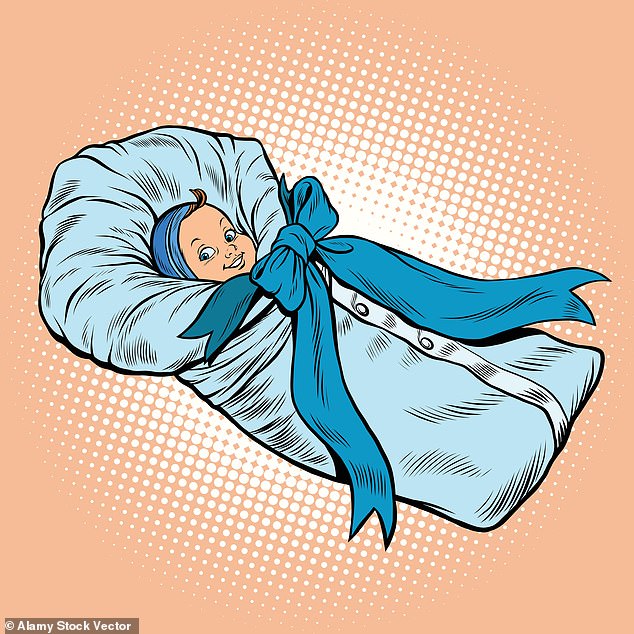A simple, flexible plastic device, developed by doctors in Sweden, could help prevent women from suffering a perineal tear during childbirth.
The device, called Babyslide, reduced the chance of a serious tear in new mothers (the highest-risk group) by up to 60 percent, new research shows. Inserted between the vaginal wall and the baby’s head at the time of crowning (when the head becomes visible), the device is said to help distribute the pressure of the baby’s head over a larger surface area, thus reducing the possibility of a tear.
Tearing of the perineum (the area between the vagina and anus) can occur when the baby passes, as a result of tissue stretching. It’s very common: according to the NHS up to nine in ten first-time mothers who have a vaginal birth will have some type of tear.
As Dr. Kristin Andre, a doctor of obstetrics and gynecology at Helsingborg Hospital in Sweden, who led the recent study, explains, tears can cause short-term problems such as pain and irritation as a result of damage to the mucous membrane of the vagina; as well as long-term problems including incontinence and sexual dysfunction due to damage to the pelvic floor muscles.
Tears are classified according to their severity. Grade 1, or first degree, tears are small cuts or scrapes that affect only the skin and usually heal quickly, without treatment. Grade 2 (second degree) tears affect the perineum muscle and skin and usually require stitches.
A third or fourth degree tear is deeper and involves the anus/anal sphincter (a group of muscles around the anus that controls the release of stool) and needs repair in an operating room.
The Swedish team said studies suggest that up to seven in ten new mothers experience grades 2 to 4 perineal tears, but the majority are grade 2.
Second-degree tears can impair sexual function and increase the risk of painful intercourse, urinary incontinence, and pelvic organ prolapse. And 15 percent of women with a second-degree tear may experience anal incontinence a year after giving birth to their baby, according to previous research.
Meanwhile, a third- or fourth-degree tear may be “a leading cause of female anal incontinence and may lead to long-term morbidity (illness),” the researchers said.
However, despite the number of women affected and the impact of these injuries on their quality of life, “few preventative measures have been shown to reduce the number of perineal tears.”
Currently, midwives can use warm compresses and perineal massages, which aim to make the tissue more flexible.
However, a highly regarded 2017 Cochrane review found that these did not help reduce second-degree tears, although there was some “moderate quality” evidence that they may reduce third- and fourth-degree tears.
The new Babyslide device reduced grade 2 to 4 tears by 60 percent. It is made of Santoprene, a soft, flexible plastic. It consists of a longer flat strip of soft plastic (called a “tongue”) and has two smaller wings at 90-degree angles on either side, made of the same material.
During crowning, the larger strip is inserted between the baby’s head and the back wall of the vagina; The shorter wings are positioned externally, where the doctor or nurse holds them in place, to ensure continuous manual pressure on the perineum throughout delivery.
For the new study, 92 pregnant women were randomly divided into two groups: one had the Babyslide used during delivery, while the other group received standard care.
Results published in the American Journal of Obstetrics and Gynecology Maternal-Fetal Medicine showed that women in the Babyslide group had a significantly lower risk of suffering a more extensive perineal tear than those in the control group.
Additionally, despite concerns that the tool itself could increase labia tearing (the folds of skin around the vaginal opening), they found that it actually reduced labia tearing, possibly because the pressure was distributed over an area wider.
Dr Andre says the Baby-slide device, which costs £44 to buy privately, is easy for doctors and midwives to use and does not appear to be uncomfortable for mothers, although this was not assessed in the study. He adds that warm compresses could still be applied with the device in place.
Commenting on the research, Soo Downe, professor of midwifery studies at the University of Central Lancashire, said: ‘Reducing perineal tearing is important for women of childbearing age.
‘We know that some approaches, such as hot compresses and massage, can reduce more serious tears and should be offered to women routinely.
“This study suggests that there may also be a way to prevent mid-level (second-degree) tears. This is an important finding. However, as the authors said, the study is small and was conducted in a single hospital in Sweden.
“Before the device is widely used, the results need to be tested in more sites, with a variety of women and with different approaches to childbirth to see if they remain valid.”


